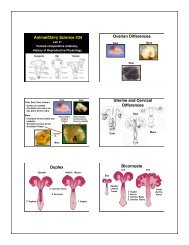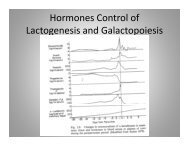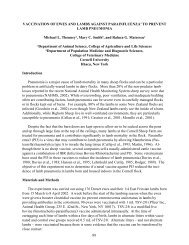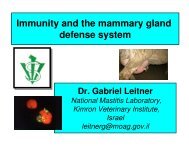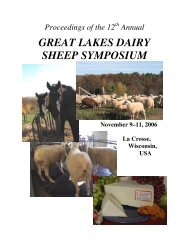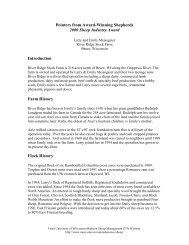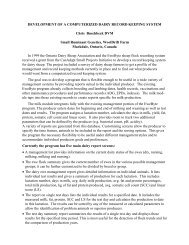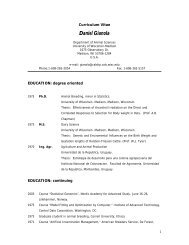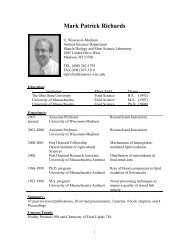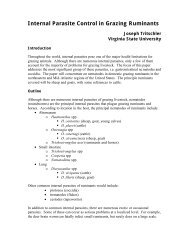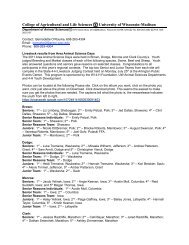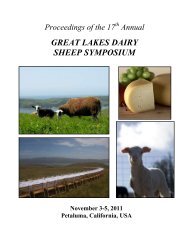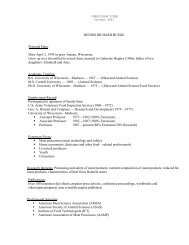Dairy Sheep Symposium - the Department of Animal Sciences ...
Dairy Sheep Symposium - the Department of Animal Sciences ...
Dairy Sheep Symposium - the Department of Animal Sciences ...
You also want an ePaper? Increase the reach of your titles
YUMPU automatically turns print PDFs into web optimized ePapers that Google loves.
eview <strong>of</strong> <strong>the</strong> literature relating to <strong>the</strong> potential for growth <strong>of</strong> pathogens in hard cheeses that are<br />
aged for at least 60 days shows that such growth is not likely to occur because <strong>of</strong> <strong>the</strong> combined<br />
effect <strong>of</strong> decreased pH, decreased water activity, and possibly o<strong>the</strong>r factors inherent to <strong>the</strong>se<br />
cheeses” (USFDA, 1999). However, in <strong>the</strong> recently released HHS and USDA Listeria risk<br />
assessment and Listeria action plan, USDA and FDA advise pregnant women, older adults and<br />
people with weakened immune systems that “cheeses that may be eaten include hard cheeses;<br />
semi-s<strong>of</strong>t cheeses such as Mozzarella; pasteurized processed cheeses such as slices and spreads;<br />
cream cheese; and cottage cheese.” However, persons residing in <strong>the</strong>se risk groups are advised<br />
“do not drink raw (unpasteurized) milk or eat foods that contain unpasteurized milk.” (USDA,<br />
2001). Following are potential regulations that may be proposed:<br />
Full pasteurization <strong>of</strong> all cheese milk<br />
This was <strong>the</strong> first fear that most cheesemakers had when <strong>the</strong> question <strong>of</strong> safety <strong>of</strong> raw milk<br />
cheeses was first raised in 1995-96. However, with <strong>the</strong> statement made in 1999 concerning <strong>the</strong><br />
safety <strong>of</strong> hard cheeses (listed above, USFDA, 2001) and <strong>the</strong> dialogue going between <strong>the</strong> FDA<br />
and American Cheese Society, indications are that FDA may be willing to accept raw milk hard<br />
cheeses that are aged for 60 days. FDA will most likely require some additional regulations<br />
concerning <strong>the</strong> potential presence <strong>of</strong> pathogens in raw milk used for cheesemaking. S<strong>of</strong>t ripened<br />
and semis<strong>of</strong>t ripened cheeses will be required to be manufactured from pasteurized milk.<br />
Raw milk hard cheeses with HACCP at <strong>the</strong> farm (Amer. Cheese Soc. Plan)<br />
This is <strong>the</strong> current recommendation for future production <strong>of</strong> raw milk hard cheeses being<br />
proposed by <strong>the</strong> Cheese <strong>of</strong> Choice Coalition. Critical control points in <strong>the</strong> HACCP program at<br />
<strong>the</strong> farm would include antibiotic testing, temperature requirements on cooling and holding <strong>of</strong><br />
<strong>the</strong> raw milk and routine testing <strong>of</strong> incoming lots <strong>of</strong> raw milk for pathogens to ensure safety <strong>of</strong><br />
raw milk cheeses. The difficult aspect <strong>of</strong> this proposal involves <strong>the</strong> cost and time <strong>of</strong> analysis for<br />
pathogens in <strong>the</strong> raw milk. What pathogens do you test for and do all lots <strong>of</strong> milk have to be<br />
tested for pathogens? Assuming that you get some reduction <strong>of</strong> pathogens during <strong>the</strong> 60 day<br />
aging period, will FDA allow a minimum level <strong>of</strong> pathogens (for instance,



